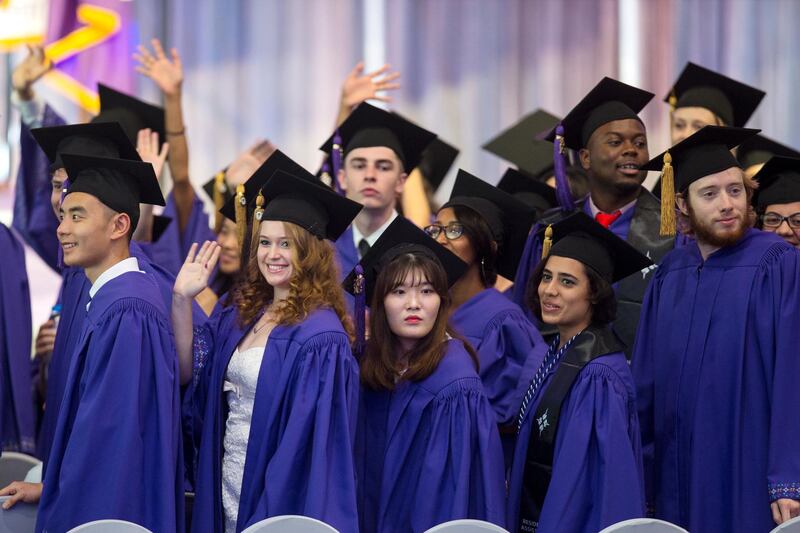Set in the English county of Kent, an hour by train from London, Canterbury Cathedral is one of the most magnificent buildings in Europe. It’s 1,000 years old, one of the oldest buildings in Britain and in the past week, it has also been one of the happiest.
Students and their families from all over the world and of all faiths have been taking part in joyful university graduation ceremonies. Those receiving degrees come from Europe, the Americas, the Middle East, Japan, China, India, Brunei, Malaysia and countless other countries. Some wear Ghanaian Kente cloth, some wear hijabs. Others have Scottish tartan kilts or Norwegian traditional dress. University graduation ceremonies like this have been taking place at the end of term across the world, as the best and the brightest young people are rewarded for their many years of study.
As Chancellor of the University of Kent, I have formally awarded the degrees over the past week to about 5,000 students and shaken them all by the hand, looked into their happy faces and wondered what kind of world they will shape as their future. Right now we are used to the deluge of so-called “fake news”, the bitter political arguments in which facts, experts and expertise are undervalued and derided and when lying at the top levels of political life has, for some at least, become normal.
What then is the purpose of a university in the 21st century, since universities are in the facts business? Facts are what we do. So how should we respond to those who denigrate facts and attack or undermine experts who try to bring knowledge where there is none?
Universities uphold the values of the Enlightenment, a word which means precisely what it sounds like – bringing the light of reason into the darkest corners. That means universities are in existence to promote facts, science, research, critical thinking, honest debate, scholarship and expertise.
And yet universities and other great institutions of learning are surrounded by a swamp of information, some of it deliberately and mischievously aimed at undermining facts, genuine research and scholarship.
There is, for example, a campaign to tell people that vaccinations against serious diseases do not work or will harm the health of children. There is no scientific or medical evidence for these claims. We are told by some people – often politicians with no expertise in climate science – that climate change is not happening. The world’s experts say the science shows that it is.
In political life, we are told by some that there is no evidence that the Assad regime used chemical weapons in Syria, or that Russia was not behind the nerve gas attack in Britain. Some of those who investigate these claims believe they are false.
Since most of us are not epidemiologists, climate scientists or chemical weapons experts, we need to build and promote trust in those who are. Universities and educational establishments exist so that we can make life better for all of us, be more creative and more productive and have more fun.
Universities are not merely buildings full of knowledge, laboratories, books and clever people – they are institutions which live up to the values of the Enlightenment. That means they are a good place to begin to kill off “fake news”, the deniers of facts and science and malicious people who try to make us believe in lies.
But there is a problem. Experts, academics and scientists sometimes have difficulty explaining why their expertise and knowledge is both genuine and worth listening to.
So here is a modest proposal. Nobody can be an expert in everything. But if you would not get in a taxi driven by someone who had not driven before and if you would not visit a doctor who knew nothing about medicine, maybe it is time to cherish expert opinions and listen to those who have knowledge through study.
And experts also have a responsibility. They need to turn themselves into good communicators to inform those of us who are not experts – that is, most of us – about the difference between evidence, research and facts on the one hand, and uninformed opinions on the other.
When President John F Kennedy became president of the United States, the White House was described as Camelot, the home to “the best and the brightest” in American society. It wasn’t perfect but at least Kennedy was intelligent enough to understand he needed other clever people to help him lead his country.
Universities are not perfect either, but the young men and women from all over the world who have graduated this week have the chance to lead us into a better future. I am confident they will accept the challenge.
Moreover, universities in the UAE and elsewhere demonstrate one obvious fact about our world. Most of the problems we have are not national but international – conflict, famine, climate change, poverty, migration. The solutions therefore are bigger than any one country.
Young people who study with others from different countries, backgrounds and faiths, understand one big fact: to make things better, we need to work together.
Gavin Esler is a journalist, television presenter and author





